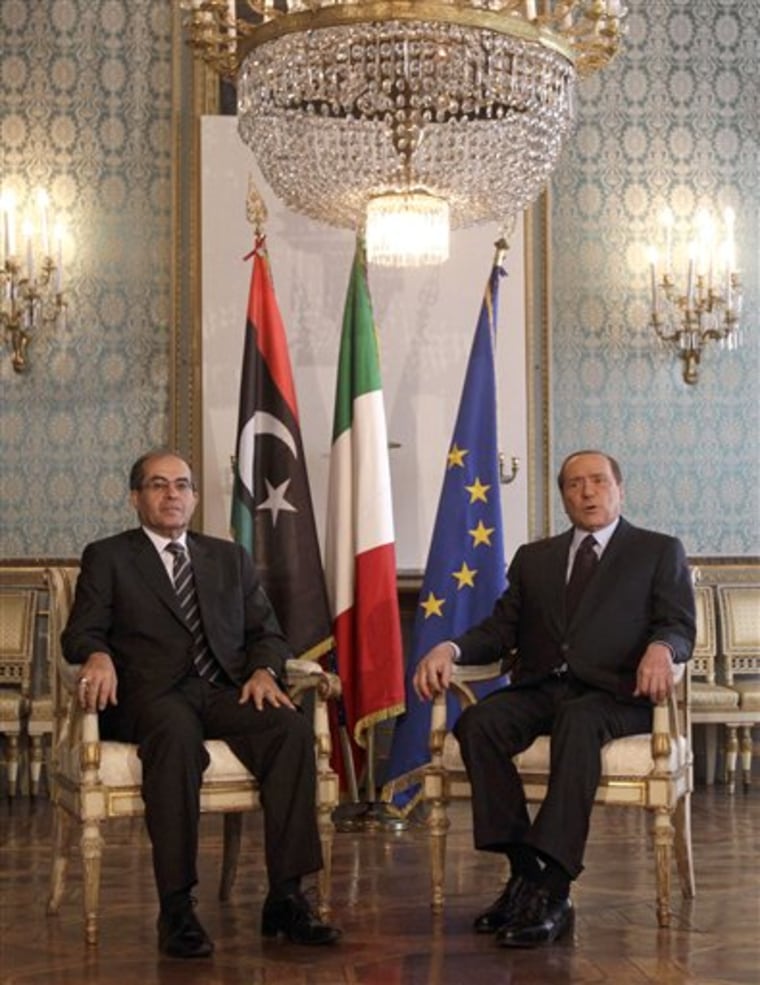The United States and South Africa struck a deal Thursday to allow the release of $1.5 billion in frozen Libya funds for humanitarian aid and other civilian needs, U.N. diplomats said Thursday.
Council diplomats said the agreement would enable the funds to be released without a U.N. Security Council vote on a U.S. draft resolution that Washington submitted to the council Wednesday in response to South Africa blocking a U.S. request to disburse the money in the U.N. Libya sanctions committee.
The Libyan opposition said it urgently needs at least $5 billion in frozen assets to pay state salaries, maintain vital services and repair critical oil facilities. Analysts estimate that as much as $110 billion is frozen in banks worldwide.
Italian Prime Minister Silvio Berlusconi said Thursday that Italy plans to release €350 million ($505 million) in frozen Libyan assets.
'We need urgent help'
Senior officials from more than 30 nations were meeting Thursday in Istanbul to discuss ways of assisting Libya's opposition in the post-Gadhafi era and the unfreezing of billions in cash and assets.
"We need urgent help," Mahmoud Jibril, head of the opposition National Transitional Council, said in Milan on Wednesday after meeting with Berlusconi and before heading to the Istanbul meeting. "We are here for an urgent call. There are high expectations. While the liberation of Tripoli is in the last and final stages, the battle is still going on."
Deputy Secretary of State Bill Burns, who led the U.S. delegation in Istanbul, said the meeting was characterized by an "upbeat spirit and recognition of what our combined efforts have helped to achieve."
He said the TNC has committed to pursuing democratic reform, upholding Libya's international obligations and respecting human rights as well as to distribute funds in a transparent manner that addresses the needs of the Libyan people.
"Now more than ever, we will look to the Transitional National Council to live up to those responsibilities and to implement its transition roadmap," he said. "It is critical that the TNC continue to engage with stakeholders across Libya."
Stability at risk
Jibril warned that stability and security were at risk if rebel salaries, unpaid for four months, weren't delivered. Among the other urgent priorities, he said, were collecting weapons, rebuilding a justice system and national army, providing care to the wounded in Libya and abroad, and rebuilding power stations.
U.N. political chief B. Lynn Pascoe said several ministers from the NTC were moving to the capital, Tripoli, even though there is still fighting there.
"It's clear that the NTC is moving forward to form its government there, and to get its people in place early on, and the U.N. will be there with them, and right after them as conditions permit," he told reporters after briefing the Security Council on Mideast issues.
"One thing that the Transitional National Council has made very clear is that they expect the U.N. to play a strong role in the post-conflict period," he said. "Any process will be a Libyan-led one. What we are doing is trying to help them."
The U.N. had been preparing for the possible deployment of military observers in the event of a ceasefire in Libya, but Pascoe said "there is at this point no plan whatsoever to have any (U.N.) blue helmets there."
Italy's Berlusconi announced plans to unfreeze Libyan assets following the meeting with Jibril, his second stop of a European diplomatic tour to push for the urgent release of billions of dollars in frozen Libyan assets.
The United States has been trying for more than two weeks to get the Security Council sanctions committee to unfreeze the U.S. assets to pay for immediate humanitarian aid, but South Africa objected.
British Prime Minister David Cameron called South African President Jacob Zuma and they "agreed that Libya now has the opportunity for transition to a peaceful, democratic and inclusive government and they discussed how the international community should actively and urgently support this process," Cameron's office said in statement.
Zuma had earlier pledged to support the release of $500 million, and said African leaders meeting Thursday in Addis Ababa would discuss the unfreezing of additional assets.
